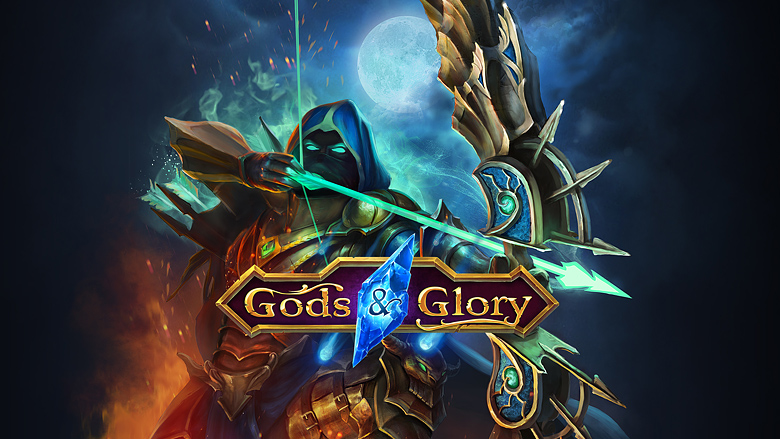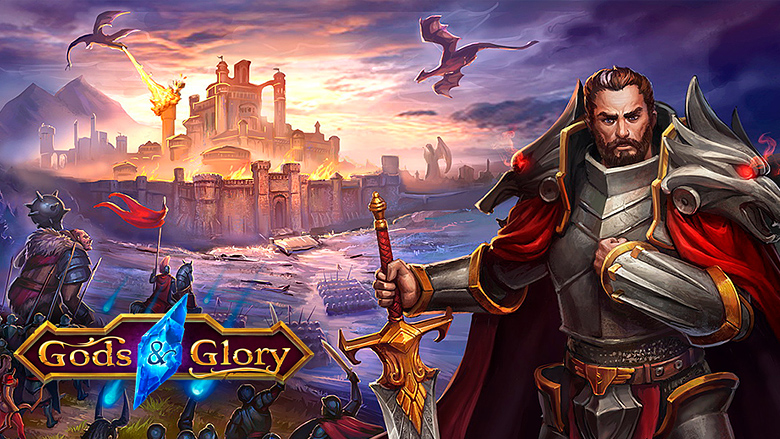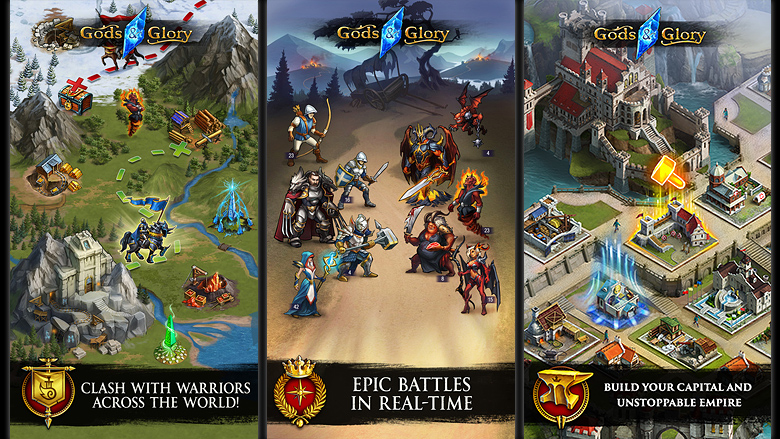What is the difference between hardcore mobile strategies from each other, why and who plays them, as well as what difficulties their developers face, – said Stas Savvinykh, CEO of Novosibirsk Friday’s Games, in an interview with App2Top.

Friday’s Games has developed a hardcore Gods & Glory (“Heroes: Rage of the Gods”). The soft launch of the game took place a year ago. In 2016, the game had a publisher – Wargaming. The world release of the game took place this November. Today, the game is consistently included in the box office Top 50 in the CIS countries on iOS and Android.
Hi! How to develop a hardcore strategy for mobile devices?

Stas Savvinykh, CEO of Friday’s GamesHello.
First of all, to develop a hardcore strategy, you need a talented and experienced team that wants to develop this strategy. It is desirable that the experience was in the development of similar projects — at least the fritupley format.
Then investments are needed — about two million dollars if the project is being developed in the CIS.
The next point is marketing support, since marketing is now as important a component of the project in the mobile market as, for example, programming and game design with art. Taking this opportunity, I want to express my gratitude to the entire Friday’s Games team: guys, I am very proud of you that we were able to achieve such a result already with the first independent project!
Is it possible to develop it if initially you don’t like the genre, but you need to? And if so, how to do it?
First we need to figure out who needs it and why. I would not advise, in principle, to develop anything if the team does not like it, since nothing good can come of it by definition. There are more interesting ways to spend a couple million dollars.
It is necessary to do what you want, and what has the maximum amount of accumulated experience, since you can earn in general in any genres and on any platforms, it all depends on the current team and the current state of the market. Well, this is if there is a task to earn. If the beneficiary has any other goals, then I would recommend to start by sitting down and thinking hard for everyone. The team should understand whether it wants to spend the next few years of its work experience on what it does not like to do, and the customer — whether he is ready to part with such a sum painlessly, or it is still better to buy a couple of new cars and fly to Vegas for a week.
From the outside, hardcore mobile strategies seem boring and similar, like twin brothers, projects. So what are the differences between them?
In fact, there are practically no differences between them. At the moment there are two main subgenres — Game of War clones and Clash of Kings clones. This can be said to be the European and Asian schools of hardcore strategies, originating from the old browsers. They have quite a few differences in cycles, event construction, and general philosophy. If Game of War is originally a game for wealthy men 35-40 years old, and in fact it is a descendant of the good old “Travian”, wrapped in an interface and cycles a la Mob Wars, then Clash of Kings stepped a little further and “proved” the whole thing externally, leaving the basic principles so that the project looks more like for a normal game with at least a more or less understandable interface. And thereby expanded the audience.
Why do clones become successful? Mainly due to the fact that quite a lot of players go between different projects as between servers of the same game, and it’s even convenient for them that the rules there are no different, since they immediately understand how much they need to push to immediately pump up to the maximum level and start a war for the title of server king.
The audience from Game of War goes to “Vikings” from Plarium, and the audience of Clash of Kings goes to War and Order and the “King of Avalon”. Usually the life of the server is about one and a half to two years, so just at this time you can start to hunt players with the help of advertising. The “King of Avalon”, for example, advertising says that the game is from the creators of Clash of Kings, although this is not the case at all.
Why are there so few types of strategies on the market and are they all similar? Because this is a feature of the mobile market: for example, there are also two or three types of “three-in-a-row”, and there are also two or three types of a BURROW. Experimenting is long and expensive, and the more complex the genre, the longer it will take to evolve. Or maybe it won’t be at all, and Clash of Kings and Game of War are the most effective projects from the point of view of monetization. Time will show.

What is the most important thing in such projects?
I would say that in such games there are two main entities that influence success — socialization and balance. By socialization, I mean all the mechanisms by which players can interact and compete — helping each other, attacking and defending together. I also include here a variety of single and clan events and ratings that set medium- and long-term goals. Balance is how much the game is able to keep the player in suspense, because if it’s too easy to play, then it’s boring, and if you’re constantly being “bent over” and you can’t do anything about it, then few people will like it either. All this is regulated by the right balance. Community management is also a very important element. It is very important for loyal players to receive feedback from the game in order to understand that the developers are engaged in the development and support of the project.
Thanks to what did Gods & Glory find its niche within the genre?
Our game is very different from the competition in the presence of a fighting game adapted for strategy, as well as a large amount of metagame associated with it. Pumping, crafting and so on. That is, Gods & Glory is essentially a strategy plus a “battler”, and many players like it.
Who plays these games, who pays for them and for what?
These are mostly men over 25 years old, who are interested in socialization and social status. In fact, all such games are about chat, communication, various social interactions. That is why the player is immediately encouraged to join an alliance and communicate, exchange resources and reinforcements. They pay for a lot, because there are a lot of monetization points in such games — but mainly for various accelerations.
Why, despite the success, there are not so many such projects (actually a lot, but still less than slot games or three-in-a-row games)?
Because it’s much more difficult to make MMO projects than projects for a single player. This concerns two main points: first, the server part – in fact, the amount of work increases two or three times, since all the logic needs to be duplicated both on the client and on the server, and it also needs to be tested, administered, and so on. Secondly, it is very difficult to design a game, since the overall server economy implies a huge number of entities that need to be brought together, constantly tested to see if something has gone somewhere, if there is an overabundance of resources, etc., etc. At the moment we have four on the balance sheet a game designer, and this is far from the limit: you can easily hire as many more, and still various “non-priority” tasks will remain overboard. The total size of the team for such a project can vary from thirty to eighty people. The size of the team for “three-in-a-row”, time managers, slots, for comparison, is from ten to thirty, moreover, there is no server part in these genres and game design is much simpler. That is why there are more simple projects on the market than complex ones.

Is it possible to call this genre guaranteed to be successful? Or at least claim that there is less risk here compared to others?
Game Dev is, in general, a very high-risk business. Guarantees in it come not from projects, but from an experienced team and competent management: as I have already said, you can earn money in any genre if it is made by an experienced team, with an understanding of the market and, most importantly, with a soul. And do not forget about the survivor’s mistake: I know much more strategies that have not reached the release than “three-in-a-row”.
Before working with Wargaming, the project already showed a positive ROI, why did you decide to work together with this publisher?
Because after receiving information about a positive ROI, there are still nine months of softlonch, plus marketing costs, plus six months of a cash gap to pay back traffic — so additional investments would amount to about a million dollars. There is also a certain scaling problem: the Novosibirsk market, in fact, is not ready to launch and operate large MMO projects – so it was decided to find a partner to share financial risks and with the necessary operating experience. We were negotiating with several potential partners, but decided to accept the offer of Wargaming as the most experienced player in the market of global multiplayer projects. At the moment, we are quite happy with the cooperation: in Wargaming Labs, an excellent team has been selected for our project under the leadership of Andrey Zimenko, with whom we can effectively solve any existing issues.
Thanks for the interview!
